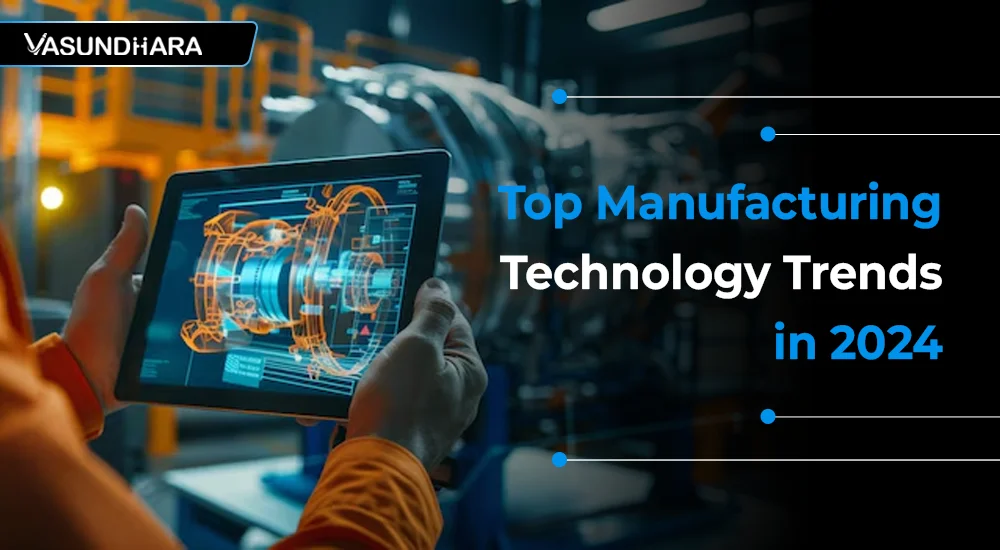Top Manufacturing Technology Trends in 2024


- Feb 16, 2024
The manufacturing industry, a cornerstone of global economic development, is undergoing a transformative phase fueled by rapid technological advancements.
Staying abreast of the latest trends in manufacturing technology is crucial for companies looking to thrive in this dynamic landscape
In 2024, we find ourselves at the intersection of innovation and efficiency, witnessing the evolution of manufacturing technologies, what is the latest in manufacturing and manufacturing trends in India that redefine the industry.
More than half (54%) of manufacturing companies expect to spend 10% or more on software in 2024 compared to 2023.
Business intelligence and analytics software are important priorities for manufacturers.
The most difficult obstacles for firms when considering investments in new software are identifying the proper technology (47%), as well as interoperability with their existing systems (44%).
Manufacturers say they must identify goals, conduct a security review, and create a supplier risk assessment.
Industry 4.0 represents the fourth industrial revolution, characterized by the integration of digital technologies into manufacturing processes.
Smart factories leverage data exchange, IoT (Internet of Things), and cyber-physical systems to create a more connected and efficient production environment.
The proliferation of IoT devices in manufacturing facilitates real-time data collection and analysis.
Smart sensors embedded in machinery enable predictive maintenance, minimizing downtime and reducing operational costs. This trend not only enhances efficiency but also contributes to the overall sustainability of manufacturing processes.
As we navigate through 2024, the manufacturing industry is undergoing a remarkable transformation, driven by cutting-edge technologies that redefine how products are made and processes are optimized.
Here are the latest manufacturing industry trends in 2024 shaping the industry this year:
AI algorithms analyze historical data to predict equipment failures before they occur. This proactive approach to maintenance reduces unplanned downtime and extends the lifespan of machinery, ultimately saving manufacturers time and resources.
Incorporating AI into quality control processes ensures the production of defect-free products. Machine learning algorithms can quickly identify anomalies, contributing to higher-quality outputs and customer satisfaction.
Machine learning is increasingly being employed for optimizing production processes. From demand forecasting to resource allocation, AI-driven analytics empower manufacturers to make informed decisions, enhancing overall operational efficiency.
The evolution of robotics in manufacturing is marked by advancements in both hardware and software.
From highly specialized robots to collaborative robots (cobots) that work alongside human employees, these innovations contribute to increased productivity and precision.
Cobots represent a paradigm shift in workforce collaboration. Their ability to work alongside human employees enhances productivity while maintaining safety standards.
This collaborative approach also opens up new possibilities for flexible and agile manufacturing processes.
Automation continues to be a driving force in manufacturing, streamlining repetitive tasks and allowing human workers to focus on more complex and creative aspects of their roles.
The integration of automation technologies leads to increased efficiency and reduced operational costs.
The journey of 3D printing from a prototyping tool to mainstream production technology is fascinating.
Advancements in materials and printing techniques contribute to increased speed and precision, making 3D printing a viable option for various manufacturing web design solutions.
3D printing's versatility allows manufacturers to create intricate prototypes and produce complex components with reduced waste.
The technology's ability to adapt to various materials and scales opens up new possibilities for design and production.
One of the notable advantages of additive manufacturing is its potential to reduce waste. Traditional subtractive manufacturing methods often result in significant material wastage, whereas 3D printing builds objects layer by layer, minimizing excess material usage.
AR and VR technologies are revolutionizing employee training and skill development. Virtual simulations provide a risk-free environment for training, allowing workers to familiarize themselves with complex machinery and processes before entering the production floor.
AR facilitates real-time, hands-free guidance for maintenance and repair tasks. Technicians equipped with AR devices can access relevant information and instructions, leading to quicker and more accurate problem resolution.
Virtual reality enables immersive design experiences, allowing engineers and designers to visualize and interact with their creations in 3D space.
This not only enhances the design process but also contributes to faster prototyping and product development cycles.
As manufacturing becomes increasingly connected, the importance of cybersecurity cannot be overstated. Protecting sensitive data, intellectual property, and operational systems from cyber threats is paramount to ensuring the integrity and reliability of manufacturing processes.
Implementing robust cybersecurity measures involves a combination of technology, policies, and employee awareness.
Encryption, secure network protocols, and regular cybersecurity training are essential components of a comprehensive cybersecurity strategy.
Examining real-world examples of cybersecurity challenges in the manufacturing sector provides valuable insights into the evolving nature of cyber threats. Learning from these cases helps manufacturers better prepare for and mitigate potential risks.
Digitalizing the supply chain enhances visibility and transparency. Real-time tracking of inventory, production, and logistics allows manufacturers to make data-driven decisions and respond swiftly to changes in demand.
Blockchain technology ensures transparency and traceability throughout the supply chain. Immutable and secure ledgers provide a tamper-proof record of transactions, mitigating the risk of fraud and errors in the supply chain.
The use of real-time data analytics in supply chain management allows for predictive analysis, helping manufacturers optimize inventory levels, reduce lead times, and enhance overall supply chain efficiency.
The integration of technology into manufacturing operations has been a transformative journey for industry leaders, offering valuable lessons for those looking to follow suit.
Here are key lessons learned from manufacturing industry leaders about integrating technology into operations:
Lesson: Technology integration must align with overall business strategies and objectives.
Insight: Industry leaders emphasize the importance of choosing technologies that directly contribute to business goals, whether it's improving efficiency, reducing costs, or enhancing product quality.
Lesson: Cybersecurity is not an afterthought but a foundational consideration.
Insight: Industry leaders stress the importance of implementing robust cybersecurity measures from the outset. Protecting sensitive data and operational systems is crucial for the long-term success and sustainability of technology integration efforts.
Lesson: Website solutions in manufacturing can enhance the customer experience.
Insight: Industry leaders recognize the importance of a customer-centric approach. Technologies that improve product quality, customization, and delivery timelines directly contribute to enhanced customer satisfaction and loyalty.
Lesson: Leverage data for informed decision-making.
Insight: Leaders stress the significance of data analytics in guiding operational decisions. From predictive maintenance to supply chain optimization, leveraging data insights enhances efficiency and agility in decision-making processes.
Lesson: Constantly monitor and adapt to emerging technologies.
Insight: Industry leaders emphasize the importance of staying informed about technological advancements. Remaining agile and open to adopting new technologies positions manufacturers at the forefront of innovation.
Looking ahead to the future in manufacturing, several emerging technologies are poised to further revolutionize the manufacturing landscape.
As technology continues to advance, manufacturers will face both challenges and opportunities. Addressing issues such as workforce upskilling, cybersecurity threats, and ethical considerations while capitalizing on innovations will be key to navigating the future successfully.
The manufacturing industry's ability to adapt to evolving technological landscapes will be instrumental in shaping its future.
Adopting a culture of continuous improvement and staying open to innovation ensures that manufacturers remain agile in the face of change.
The manufacturing industry is undergoing a profound transformation in 2024, driven by a convergence of advanced technologies.
From Industry 4.0 and AI to robotics, 3D printing, and beyond, manufacturers have a wealth of opportunities to enhance efficiency, sustainability, and innovation.
Vasundhara Infotech is your trusted partner in crafting exceptional websites that captivate audiences and drive results.
Let's transform your ideas into a visually stunning and functionally seamless website. Harness the power of a strong online presence with Vasundhara Infotech's website development expertise.
Get in touch today for a consultation and take the first step towards a digital journey that stands out in the crowd!
Copyright © 2026 Vasundhara Infotech. All Rights Reserved.
